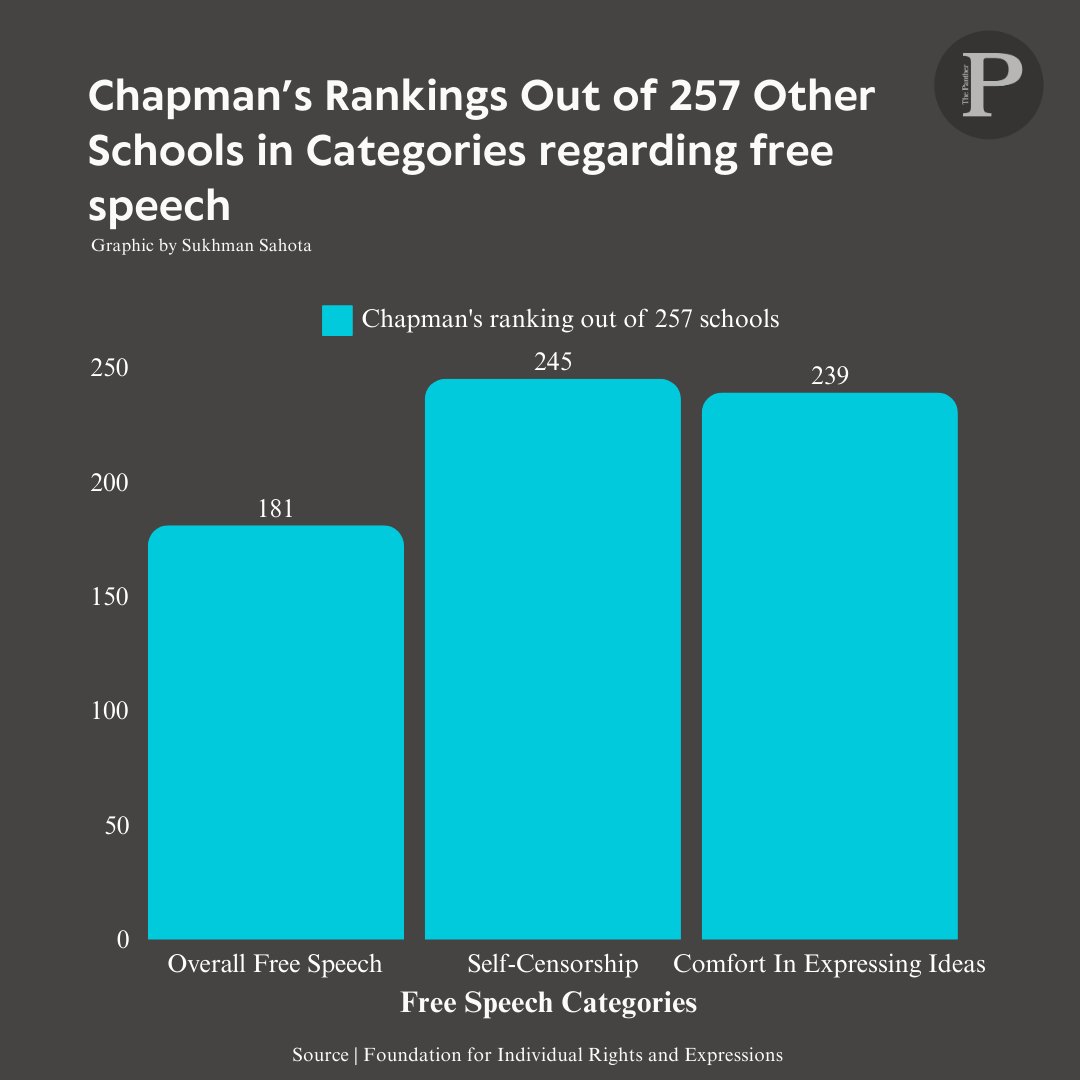2025 FIRE rankings: A conversation with Jerry Price
Graphic by Sukhman Sahota
The Foundation for Individual Rights and Expression (FIRE) recently put out its 2025 Free Speech Rankings which gives insight into how Chapman students feel regarding speech on campus. One of the most prevalent findings is that Chapman students often feel uncomfortable expressing their ideas and tend to self-censor on campus.
Historically, Chapman has received lower scores from FIRE due to how students reportedly feel and the examination of Chapman’s speech policies.
“I'm upset because I like FIRE,” said Jerry Price, the dean of students. “A lot of deans of students around the country don't like FIRE because they think FIRE causes them lots of trouble. But I've always been a believer in the educational value of active freedom and freedom of expression.”
The organization compared Chapman’s speech policies based on the thoughts of 102 Chapman undergraduate students to 257 other universities throughout the country. The lower the score, the worse the school performed in the category.
“I've always been appreciative of what FIRE does, that's why I'm annoyed that our rating isn't what I think it should be,” Price added.
Chapman’s Overall Free Speech Ranking: 181/257
Out of the 257 schools examined by FIRE, Chapman was ranked 181 in the overall free speech category. The organization noted that the higher the score of the school, the more open the climate is at the university. This means that Chapman was around the bottom 70% as far as free speech climate on college campuses.
“I mean, trust me for every call I get saying you're restricting my speech, I get 100 saying you're, you're allowing too much speech,” Price said. “You know, we had protests and things and such that people felt like they should have been allowed to do more, but I can't believe that's the majority opinion and that really surprises me.”
Chapman’s Self-Censorship Ranking: 245/257
Chapman’s overall lowest score in the FIRE rankings was the self-censorship ranking, which was 245 out of 257 schools. Self-censorship is defined as restricting what one says to avoid offending or annoying those around.
In this category, FIRE presented Chapman students with a definition of self-censorship and were then asked how often they found themselves participating in self-censorship in different spaces on campus. Some of the spaces included in the classroom, with professors and other students.
This score would roughly put Chapman in the bottom 95% of schools where students feel the need to self-censor. According to FIRE, around 54% of participants explained they find themselves having to self-censor on campus at least once or twice a month.
Chapman’s Comfort in Expressing Ideas Ranking: 239/257
The second lowest score Chapman received was in the comfort expressing ideas category. Chapman received a score of 239 out of 257 schools, resulting in being in the bottom 93% in the category. This score measures how comfortable students are expressing their thoughts through their assignments, to their peers and professors at the school.
“I do think that's a problem on campuses in general,” Price said. ”I'm surprised that we're that much different than anybody else though and I also think this is regional as well and that is in some parts of the country.”
Chapman’s Tolerance for Conservative and Liberal Speakers: 21/257 and 85/257
Chapman’s highest score for the FIRE rankings was for tolerance of conservative speakers at the university being the 21st out of 257. On the other hand, for liberal speakers, Chapman received a score of 85 out of 257. Both of these rankings were determined by the level of tolerance of either a controversial conservative or liberal speaker on campus.
These scores would roughly put Chapman in the top 8% for tolerance of conservative speakers and around 33% for liberal speakers.
In addition to these findings, FIRE also reported that the majority viewpoint of the university is conservative and for every conservative student, there is roughly one liberal.
Chapman’s Speech Code: Red
For the last couple of years, Chapman has continued to receive the red light rating for the speech code in place at the university.
The red light rating is given when there are restrictions on speech on a university’s speech policy. A yellow light rating is given when the policy is vague or more of a narrow restriction. A green light is given when free speech is not at risk.
“I think if FIRE were on campus and seeing in practice how the university implements our policies and free speech environment, they would have a different take on us than just reading the policies,” Price stated. “I think they're inferring some things from the policy that aren't reflective of how we actually behave on campus.”
In the past few months, Chapman has changed their free speech and posting requirements resulting in changes in student organizations such as limiting the C.A.R.E.S Clothesline Project and altering the thrift club events.
With these new changes occurring in Chapman’s policies, FIRE will reevaluate in the upcoming year if Chapman’s speech policies are up to FIRE’s free speech standards on college campuses.
Correction: A previous version of this article titled FIRE as the Foundation for Individual Rights and Expressions, the correct name is Foundation for Individual Rights and Expression.

